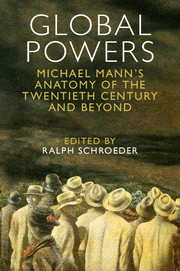Book contents
- Frontmatter
- Contents
- List of contributors
- 1 Introduction
- Part I Theory and history
- Part II Political, economic, military and ideological questions
- 5 On political decency
- 6 Mann on neoliberalism
- 7 Nationalism and military power in the twentieth century and beyond
- 8 History, historical sociology and the problem of ideology: the cases of communism and neoliberalism
- 9 Mann's globalizations and their limits
- Part III American exceptionalism
- Part IV Empire
- Part V Response
- Index
- References
9 - Mann's globalizations and their limits
from Part II - Political, economic, military and ideological questions
Published online by Cambridge University Press: 05 April 2016
- Frontmatter
- Contents
- List of contributors
- 1 Introduction
- Part I Theory and history
- Part II Political, economic, military and ideological questions
- 5 On political decency
- 6 Mann on neoliberalism
- 7 Nationalism and military power in the twentieth century and beyond
- 8 History, historical sociology and the problem of ideology: the cases of communism and neoliberalism
- 9 Mann's globalizations and their limits
- Part III American exceptionalism
- Part IV Empire
- Part V Response
- Index
- References
Summary
Introduction
Debates about globalization have waxed and waned in the social sciences. They flourished briefly after the end of the Cold War and during the economic upswing of the 1990s and early 2000s (Guillen 2001) but have subsequently receded again. Still, the debate has been left unresolved: while some continue to build social theory around the concept of globalization (Martell 2010, Walby 2009), there have also been critics (Hirst and Thompson 1996). This leaves us with the question whether social theory now embraces globalization as a master concept, or if we should revert back to earlier concepts like modernization or ‘capitalism’ or move beyond all of these and on to new concepts?
In Volumes 3 and 4 of the Sources of Social Power, Mann makes a series of arguments about globalization which I will review and assess in this chapter. I will argue that his account of the increasingly global reach of social processes can explain some aspects of social development in the twentieth century but has serious limits when it comes to explaining recent social change, especially in the post–Cold War period. Mann's theory also puts too much emphasis on the driving force of capitalism and on America's global role in sustaining it and therefore overlooks a number of tensions in contemporary globalization. To make this argument, I will focus on Mann's ideas about American empire, technoscience and the environment and consumer citizenship.
Mann proposes that there are plural ‘globalizations’, by which he means that the processes of globalization among the economic, political, military and ideological sources of social power are orthogonal to each other; they are not causally related in a direct way. In contrast, I have argued for ‘globalizing modernity’ (Schroeder 2013), whereby cultural, economic and political processes have global dimensions, but there are also causal relations between them – even if they are indirect. This difference entails that I would like to criticize Mann's theory, in a constructive way, on several counts: first, I argue that technoscientific culture is a separate source of power and autonomous vis-à-vis nature, which also means that we differ on the looming crisis of climate change. Second, I argue that markets are more disembedded than Mann allows, with the implication that the global ideological and military role of the United States is less crucial to the future of capitalism.
Information
- Type
- Chapter
- Information
- Global PowersMichael Mann's Anatomy of the Twentieth Century and Beyond, pp. 164 - 182Publisher: Cambridge University PressPrint publication year: 2016
References
Accessibility standard: Unknown
Why this information is here
This section outlines the accessibility features of this content - including support for screen readers, full keyboard navigation and high-contrast display options. This may not be relevant for you.Accessibility Information
- 1
- Cited by
